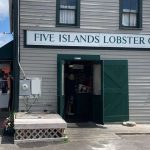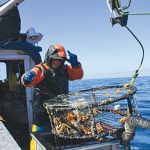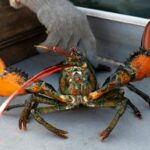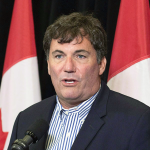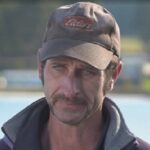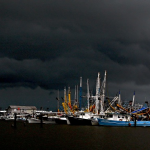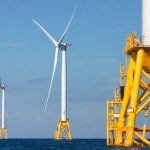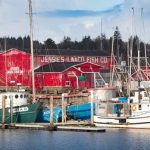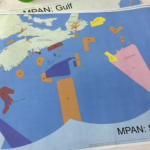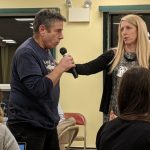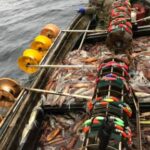Category Archives: Mid Atlantic
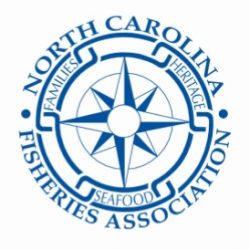
North Carolina Fisheries Association Weekly Update 01/09/2023 – Fisheries Monitoring and Data Collection/Legislative Update
The number of commercial fishermen in North Carolina has definitely been on a downward trend for some time. We have gone from 4,588 active commercial licenses in 2001 down to 2,170 active licenses in 2021 according to DMF’s most recent statistics. Although numbers of participants in our state have decreased by almost half in the last 20 years commercial fishing monitoring and data collection has not and NC commercial fishermen continue to provide a wealth of useful data that has created a permanent record showing where we came from and how we got there. The first commercial fishing data collection system I will talk about is the North Carolina Division of Marine Fisheries (DMF) fish house trip ticket program. This program started in 1994 and since then it has grown into one of the leading fisheries data collection programs in the country. >click to read the update< 12:20

Scientist calls 6-year delay in Maine lobster rules ‘mind-boggling’
Scientists dedicated to saving North Atlantic right whales from extinction say they are optimistic they can work with the fishing industry to save the species. But they were blindsided last month when Maine’s congressional delegation put language in the federal budget to delay for six years regulations that are designed to protect the whales. Amy Knowlton, a senior scientist at the Boston-based New England Aquarium, said the impact of a six-year delay in regulations could be “dramatic.” “It’s mind-boggling that this would be allowed to happen,” she said. But the Maine lobster industry has fought hard against new regulations designed to protect the whales, saying lobstermen aren’t to blame for the whales’ continued decline. Backed by Gov. Janet Mills and the state’s congressional delegation, the industry won a major victory with the six-year delay. >click to read< 15:20
Athearn Marine Agency Boat of the Week: 76′ Steel Dragger/Federal Permits, Detroit 12-V-71
 To review specifications, information, and 28 photos’, >click here<, To see all the boats in this series >click here< 13:09
To review specifications, information, and 28 photos’, >click here<, To see all the boats in this series >click here< 13:09

Offshore wind farms threaten New Jersey’s shellfish industry. Should fishing communities be compensated?
Earlier this month, New Jersey announced it would join eight other states that are seeking a regional approach to compensate fishing communities for the impending losses. “Are we going to be allowed to fish inside of them (the wind turbine fields)?” asked Kirk O. Larson, a scallop fleet owner and mayor of Barnegat Light, New Jersey. “Why did (the federal Bureau of Ocean Energy Management) put a wind farm right inside of a scallop area, the most productive scallop area pretty much on the East Coast, not counting Georges Bank.” Shellfish harvesters like Larson are expected face serious financial damage from offshore wind development projects. “I’m not looking for compensation,” said the scallop fleet owner. “I’m looking for work, so I’m not really looking for welfare.” >click to read< 07:43
Markey, Moulton push for national fund to compensate fishermen for losses due to offshore wind >click to read<
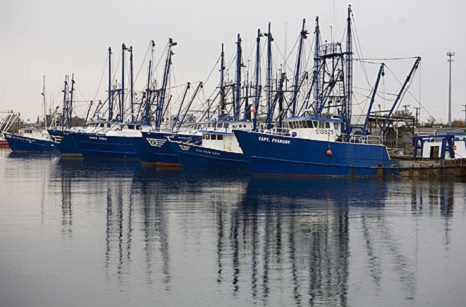
Untangling catch shares with Lee van der Voo – Catch shares have changed fisheries and fishing communities across the U.S.
I recently saw some great reporting by the New Bedford Light and ProPublica about how the billionaire Dutch family that owns Blue Harvest Fisheries has emerged as a force in groundfish fishing off the coast of Massachusetts. These are very wealthy, powerful equity groups and corporations that are acquiring access to the fisheries and passing the cost of owning them and fishing them onto fishermen. There’s been profound disenfranchisement of people who used to have a more personal stake in fishing and seafood. Everyone from indigenous communities in Southwest Alaska whose history with halibut goes back to the beginning of time to small-boat, family operations around the United States everywhere have been losing access. Whole communities have fallen apart over that. >click to read< 08:15

Personal Locator Beacons improve the chance of rescue at sea
A PLB is a personal electronic device that transmits a survivor’s location on or in the water to the Search and Rescue Satellite-Aided Tracking system during an emergency. It’s designed to be carried in a person’s life vest (or elsewhere on their body) and manually activated when the wearer is in distress. PLBs continuously update a survivor’s location. New Year’s Eve is a time of celebration and remembrance. Three years ago, on December 31, 2019, as the new year was being rung in across the lower 48 states, a tragedy was playing out in icy Alaskan waters. F/V Scandies Rose, with seven crew members aboard, capsized and sank before reaching safety. >click to read< Then, there is survivor John Aldridge, a crewmember of the 44-foot lobster  vessel Anna Mary was last seen aboard the boat during his watch relief at 9 p.m., Tuesday, while the vessel was underway off Montauk, N.Y. How many times have you read of or heard of a fisherman going overboard, only to watch an unsuccessful chain of events involving fruitless search and rescue operations to see them become possible recovery operations, and predictably, abandoned after a period of time, dictated by estimates of rate of survival and sea conditions? Way too many.
vessel Anna Mary was last seen aboard the boat during his watch relief at 9 p.m., Tuesday, while the vessel was underway off Montauk, N.Y. How many times have you read of or heard of a fisherman going overboard, only to watch an unsuccessful chain of events involving fruitless search and rescue operations to see them become possible recovery operations, and predictably, abandoned after a period of time, dictated by estimates of rate of survival and sea conditions? Way too many.
Athearn Marine Agency Boat of the Week: 52″x18″ Steel Dragger, 3406 Cat, with Permits
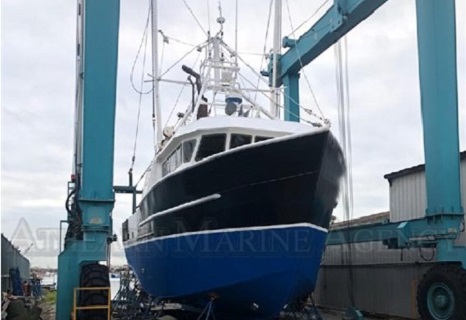 To review specifications, information, and 15 photos’, >click here<, To see all the boats in this series >click here< 11:00
To review specifications, information, and 15 photos’, >click here<, To see all the boats in this series >click here< 11:00

Green Groups Ignore Genuine Risks To Whales From Offshore Wind Farms
Environmentalists want to crack down on the Maine lobster industry in the name of protecting endangered whales, but they turn a blind eye to the greater threat to whales from proposed offshore wind farms. The irony is almost as delicious as the lobster dinners at stake. Green groups such as the Center for Biological Diversity and Defenders of Wildlife routinely target commercial fishing by claiming that it causes ancillary harm to marine species protected under the Endangered Species Act and other federal laws. This includes the North Atlantic right whale, whose population of only 350 or so migrates up and down the Atlantic Coast and can cross prime lobster territory off New England. >click to read< 11:52

Two East Coast Fishermen Sue Biden Administration Over Mid-Atlantic Fishing Restrictions
The lawsuit comes as legal challenges to the so-called administrative state, which is made up of officials who aren’t appointed by the president or subject to political accountability, become increasingly common. Raymond Lofstad of Hampton Bays, New York, and Gus Lovgren of Brick Township, New Jersey, are both fourth-generation commercial fishermen running small-scale operations in the Mid-Atlantic region. Lofstad has fished off Long Island for more than 45 years. Lovgren, who recently took over his father’s fishing boat, has operated out of New Jersey for more than 20 years. Both have the permits required to fish for flounder, scup, and black sea bass in federal waters in the Mid-Atlantic. >click to read< 13:29
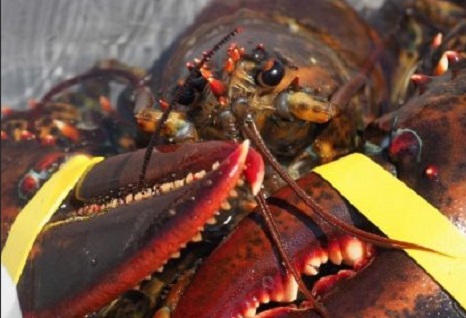
Biden’s Latest Green Energy Victim: The Lobster Industry
One of President Joe Biden’s most disgusting “Nero fiddles while Rome burns” moments came when he hosted his first state dinner for visiting French President Emmanuel Macron. While the president and his guests gorged themselves on 200 live Maine lobsters poached in butter, his administration did everything it could to regulate the Maine fishing industry, particularly lobstermen. out of existence. And they’re making the fishing industry a scapegoat for the actual peril lurking in the waters off New England — offshore wind farms. >click to read < 15:04
Athearn Marine Agency Boat of the Week: 44’11” X 20′ Novi Dragger, 3406 Cat, W/Federal, NJ Permits
 To review specifications, information, and 15 photos’, >click here<, To see all the boats in this series >click here< 11:40
To review specifications, information, and 15 photos’, >click here<, To see all the boats in this series >click here< 11:40

Wind industry group says turbine restrictions for whales could threaten commercial viability of projects
An organization that represents and lobbies for the wind industry has warned that a recommendation from federal scientists to limit turbines in offshore lease areas to protect the endangered North Atlantic right whale could threaten the commercial viability, efficiency and utilities contracts for some projects. In a letter first published by The Light last month, NOAA scientist Sean Hayes proposed establishing a “conservation buffer” zone or turbine-free area overlapping with wind development planned in Southern New England. But the American Clean Power Association (ACP), which represents the wind industry, said such a buffer would cause the removal of a “significant number” of turbines from several projects. >click to read< 07:29

Jersey Shore Mayor Says Murphy Offshore Wind Farm is Hot Air by Funded by Political Lackeys
“One day in the not-too-distant future, you’re going to wake up, look out onto the beach and see armies of gas-powered ships starting to erect “clean” windmills not too far off the coast of Ocean County,” Kanitra said. “It will be the industrialization of the last pristine resource we have in New Jersey… and it will destroy our tourism economy. It’s being sold as an environmentally friendly initiative by Shell Energy and their lackeys, but it’s anything but that. It’s simply a money grab for the BILLIONS these multinational corporations stand to make. That’s why our fishing industry is against it.” If Murphy’s offshore wind farm is environmentally friendly, then why are so many environmental organizations in the state against it? >click to read< 11:52
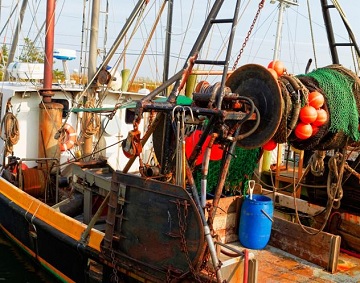
Rhode Island fishermen join lawsuit over federal at sea monitors
Rhode Island commercial fishermen have signed on to a federal lawsuit challenging a rule requiring boat captains to pay for federal monitors to observe catches. The fishermen, represented by the New Civil Liberties Alliance, have filed an amicus brief siding with fishermen from other Northeast states in a case pending before the U.S. Supreme Court challenging the new monitoring requirements. The lawsuit was filed last month in the U.S. District Court in New Jersey, by a group of commercial fishermen who want to stop the federal government from making them pay for workers who gather data aboard fishing boats. >click to read< 12:56
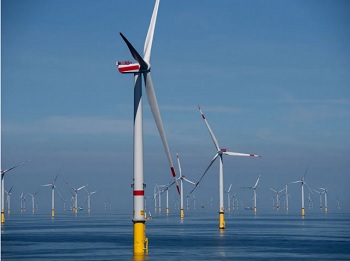
Ocean County, NJ Mayors express strong concern and opposition to Offshore Wind Farms
Point Pleasant Beach Mayor Paul Kanitra believes many people may not want to come to the beaches if these wind turbines are just offshore. “Tourism is the major economic driver in Ocean County,” Toms River Mayor Maurice “Mo” Hill said. “We do have a substantial commercial fishing industry (in Ocean County) off of Point Pleasant, Barnegat, you’ve got commercial fisheries, what impact that’ll have if they’re out using nets and they’ve got to be mindful that these are jetting up out of the water, it could impact the fishing,” >click to read< 10:53
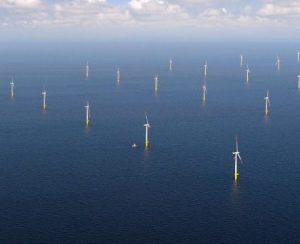
Opinion: Who owns the oceans?
There is a question that has been asked in our household for years. For us, it’s a personal question. Generations of family fisherman have been affected by the decisions of others, some known and many invisible. We have had to sit on the sidelines watching the demise of our industry while power brokers, politicians, and the money hungry chart the course when we are not even invited to the table. Now we find ourselves watching the final chapters play out, knowing that we don’t even have a role. The high jacking of our oceans didn’t happen overnight. The slow, methodical process has lined the pockets of the politicians at every level of government. Working in conjunction with private industry and environmentalists they have driven our beloved industry past the brink and left fisherman with no place left to fish. >click to read< 09:59

Offshore Wind Farms in New England Create Headaches for Both Man and Beast
“I don’t think ever in history has there been such a massive alteration of the ecosystem in such a short amount of time,” says the executive director of New Jersey-based Clean Ocean Action, Cindy Zipf. “We’re looking at 3,500 turbines as tall as the Chrysler Building, 2.2 million acres of ocean, and 10,000 miles of cable just in the Northeast in just the next seven years.” At the center of the conflict is the North Atlantic right whale and other endangered marine mammals that the Commerce Department’s National Oceanic and Atmospheric Association National Marine Fisheries Service are charged with protecting. Fewer than 350 right whales are left in the Atlantic Ocean, according to the fisheries service. >click to read< 08:14
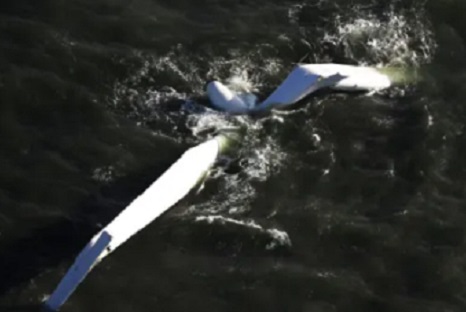
Plain Stupid: The Only Thing Dumber Than Wind Power Is Offshore Wind Power
Wind power comes with a staggering price tag, taking these things out to sea sends those costs into orbit: intermittent offshore wind power is six times the cost of gas-fired power that’s always available on demand. Placing giant industrial wind turbines miles offshore is costly enough, but the rising costs of attempting to maintain them (and the transmission cables connecting them) in a highly corrosive marine environment are positively punitive. So much so, that even the grandest of offshore plans have hit the skids, as Robert Bryce details below. >click to read< 14:55
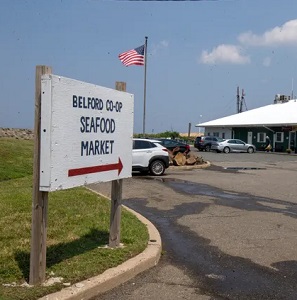
Middletown crabber’s family gets $2.75M settlement after deadly dock fall
The estate of Patrick Shopp, a commercial crabber who died from injuries related to a fall at the Belford Seafood Cooperative dock, won a $2.75 million settlement in a Monmouth County court, the family’s lawyer confirmed. Shopp initially suffered the injury on March 5, 2019. Christopher J. Conrad who represented Shopp said he fell through a broken board on the dock, lost his balance and dropped about eight feet down onto the deck of his crab boat, Scapper. Conrad said Shopp perforated his colon as a result of the fall, which required multiple surgeries over the the next 15 months. Shopp then sued Monmouth County, who owns the property, and the Belford Seafood Cooperative, which leases the property, for negligence for failure to maintain the property. >click to read< 13:03

Doomed to Fail: In the Northeast and Mid-Atlantic, a quiet reckoning over offshore wind
Crippling European electricity prices, soaring Northeastern heating bills, looming diesel-fuel shortages, and OPEC+ drama have captured headlines for months. More quietly, offshore-wind energy developers are discovering their projects’ economic infeasibility, undermining states’ offshore-wind goal of generating 40,000 MW by 2040. The Biden Administration must recognize this is a pipe dream, or it will cost Americans billions trying to salvage an industry doomed to fail. October brought the first sign of troubles,,, Massachusetts’ Commonwealth Wind, Mayflower Wind project, New Jersey Ocean Wind. All three project developers originally negotiated prices far above wholesale market prices. All three qualified for a production tax credit and additional offshore-wind state tax credits. All three will qualify for a new 30 percent offshore wind investment tax credit which was not available when they made their initial bids. Yet this federal and state largesse has still failed to keep the projects afloat. >click to read this< 18:17

Virginia Agrees to Compensate Fishing Industry for Damage from Offshore Wind Farms
Nine states, including Virginia, have agreed to establish a major compensation fund to pay their private commercial and recreational fishing companies for damages caused by offshore wind turbines. Three guesses where the money comes from. The announcement, made December 12, hints at it coming from project developers, but in Virginia of course that is a monopoly utility guaranteed by law to collect all costs from its customers. If the worst fears over CVOW’s impact on commercial fishing prove correct, a shrinking supply of seafood from the continental shelf will likely raise the prices on what is still coming to stores and restaurants. People may pay more both ways. >click to read< 07:31
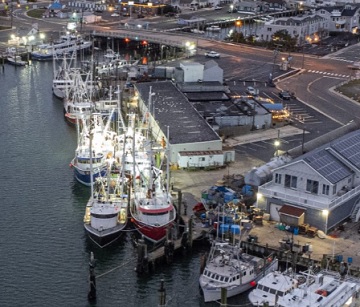
N.J., N.E., to Consider Fund to Compensate Fishermen for Revenue Lost to Offshore Wind Development
New Jersey is one of nine states that will consider a plan to establish a fund that would compensate commercial fishermen for losses that could be sustained due to impending offshore wind development. The states – Maine, New Hampshire, Massachusetts, Rhode Island, Connecticut, New York, New Jersey, Maryland, and Virginia – on Monday released a Request for Information (RFI) aimed at receiving input from impacted members of the fishing industry, offshore wind developers, corporate and financial management entities, as well as interested members of the public, to inform efforts to establish a regional fisheries compensatory mitigation fund administrator. “Mark off the area and then compensate us,” commercial fisherman Jim Lovgren, of Point Pleasant, said at a meeting on the topic five years ago,,, Photos, >click to read< 07:38
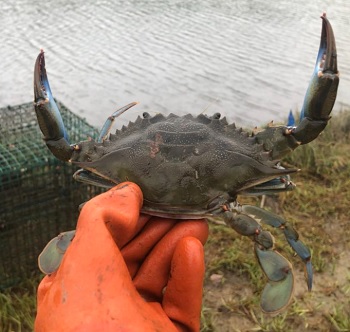
Surprising Blue Crab Population Develops In Maine
Up in the Gulf of Maine, outside the crabs’ historic range, these creatures are a source of surprise. But over the past few years, it has become more and more common for people to find blue crabs. Lobster fishermen and women are catching them in their lobster pots. Divers are seeing them when they search for scallops. Beachgoers are spotting them in tide pools. “We don’t want to make claims yet that this is a permanent population,” Crane said. “If we’re finding blue crabs for five or ten years in the same locations, that starts to be a more compelling argument that this is a permanent population.” >click to read< 15:24

BOEM and NOAA announce joint strategy for fisheries surveys
BOEM and NOAA Fisheries are announcing a joint strategy to address potential impacts of offshore wind energy development on NOAA Fisheries’ scientific surveys. The Federal Survey Mitigation Strategy underscores the agencies’ shared commitment to the Biden-Harris Administration’s clean energy goals of responsibly advancing offshore wind energy production while protecting biodiversity and promoting ocean co-use. “This joint strategy will help ensure the quality of NOAA’s fisheries surveys and data are maintained while the nation develops offshore wind energy,” said Janet Coit, assistant administrator for NOAA Fisheries,,, >click to read< 08:57
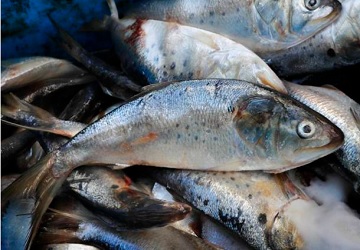
Virginia Regulators to Consider Changes to Menhaden Fishing Regulations
Virginia regulators will consider changes to commercial menhaden fishing in the Chesapeake Bay following requests from recreational anglers to put an end to the fishery. The proposals follow repeated requests from the Virginia Saltwater Sportfishing Association to stop menhaden fishing in the Bay, including a petition of 11,000 signatures that was presented to the office of Republican Gov. Glenn Youngkin earlier this year. Reedville-based Omega Protein, the lone player in the Bay’s menhaden reduction fishery, which processes catches into fishmeal or fish oil, says the new regulations take away available fishing grounds that include uninhabited areas. Taking operations completely out of the Bay into less safe conditions in the ocean would ultimately force the company to stop operating. >click to read< 11:51
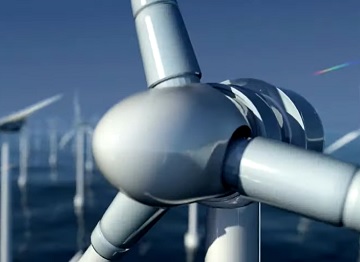
Feds: Whales Must Be Protected from Turbines
Soon after a group of opponents to proposed East Coast offshore wind projects hired a law firm with environmental regulation expertise, the federal Bureau of Ocean Energy Management (BOEM) announced a new plan to protect North Atlantic Right Whales and put it out for public comment. The opponents, with Thomas Jefferson Institute for Public Policy as part of the coalition, had been pointing to the impact of the project on the whales for months and this protection and mitigation plan admits the problem is significant. One apparent result of that will be a major delay in publication of the draft environmental impact statement (EIS) on Dominion Energy Virginia’s Coastal Virginia Offshore Wind (CVOW) project off Virginia Beach. >click to read< 09:48
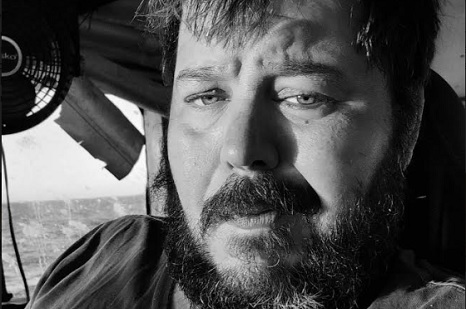
So, let’s talk about why the assessment surveys by NOAA research vessel data is corrupt.
So, let’s talk about why the assessment surveys by NOAA research vessel data is corrupt. The research vessel only makes computer generated tows randomly prints the tow log for the assessments to take place. The research vessel goes to those designated sights and makes 20-minute tows then on to the next tow. The fall survey lasted 66 days from start to finish. They were supposed to make 377 tows at 20 minutes a piece the vessel started in Virginia and tow logs were to be made all the way to the Gulf of Maine. Only 308 tows were made in this 66-day assessment. 308 tows were accomplished of the 377 supposed to be towed so only 82% of the survey was completed. If you look at the tow areas, only 30 tows were made in the Gulf of Maine. >click to read<, By Jerry Leeman

Commercial Fisherman Thomas “Tommy Guns” Blevin, 60, of Wildwood, NJ, has passed away
Thomas “Tommy Guns” Blevin, 60, of Wildwood, NJ, passed away on November 9, 2022 after a brief illness. Tommy is a beloved grandson, son, nephew, brother, uncle, cousin, father, and true friend. He was a proud commercial fisherman for over 4 decades, as close to a true modern day pirate as one would ever meet these days. When he wasn’t on the sea, he was an avid outdoors man and skilled carpenter. He never passed an opportunity to share memories of days gone by scalloping, crabbing, etc. with his mates. >click to read< 10:53
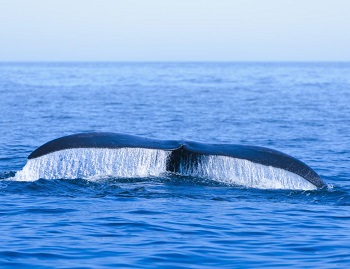
Wind Projects Off New England Put Endangered Right Whales at Risk, Warns NOAA Scientist
Planned wind projects off the New England coast threaten to harm the region’s dwindling population of endangered right whales, according to a US government marine scientist. The warning from a top National Oceanic and Atmospheric Administration official, obtained by Bloomberg under a Freedom of Information Act request, underscores the potential legal and environmental perils of offshore wind development along the coast. President Joe Biden has a goal of deploying 30 gigawatts of offshore wind within the decade. Both initial construction of wind projects and decades of expected operation threaten to imperil right whales in southern New England waters, Sean Hayes, chief of the protected species branch at NOAA’s National Northeast Fisheries Science Center, said in a May 13 letter to Interior Department officials. >click to read< 11:26
Athearn Marine Agency Boat of the Week: 72′ Steel Offshore Lobster/Crabber, 460HP Cat, Price Reduced
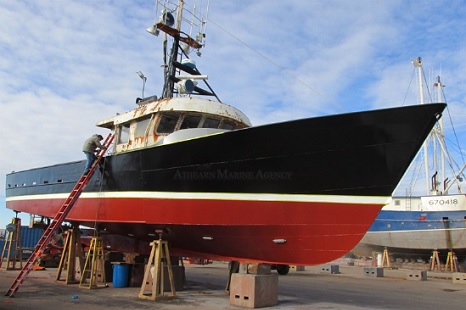 To review specifications, information, and 51 photos’, >click here<, To see all the boats in this series >click here< 11:20
To review specifications, information, and 51 photos’, >click here<, To see all the boats in this series >click here< 11:20

































